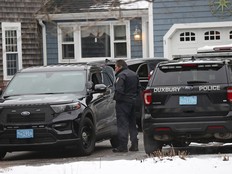Her great-grandmother, raised by a single dad, started Father’s Day in 1910

Article content
Reviews and recommendations are unbiased and products are independently selected. Postmedia may earn an affiliate commission from purchases made through links on this page.
Betsy Roddy’s family used to send a Father’s Day card each year to her great-grandmother, Sonora Dodd. The unusual practice seemed an obvious tradition to her family: Dodd invented Father’s Day.
It was 1909 when Dodd suggested at a Mother’s Day church sermon that dads should have their day, too.
Dodd and her five siblings were raised by their father after their mother died in childbirth. Dodd’s dedication to her father led to a decades-long fight for Father’s Day to become a national holiday, which happened in 1972, six years before Dodd died at age 96.
Dodd now has two living descendants, Barbara Hillerman, 90, and Roddy, 63, both of whom share Dodd’s story whenever they can in hopes of commemorating her contributions.
Speaking about Dodd’s efforts to create Father’s Day, Roddy told The Washington Post: “I don’t know that I appreciated how important that was until later when I started digging into it and realized how much work had gone into that.”
Roddy said she and Hillerman have reviewed more than a 100 newspaper and magazine clippings, letters, reports, pamphlets, drawings, photos and other artifacts that Dodd left behind – which Whitworth University in Spokane, Washington, digitalized – to piece together Dodd’s story.
William Jackson Smart, a Civil War veteran who worked as a farmer, raised Dodd and her brothers – Charles, George, Marshall, Henry and Fred – alone after their mother, Ellen, died in childbirth in 1898.
In May 1909 – 11 years before women could vote – Dodd attended a Mother’s Day sermon at a Spokane church with her husband, John, when she suggested fathers should also be honored. Over the next year, Dodd petitioned for a holiday, which Spokane’s mayor and Washington state’s governor supported.
The first Father’s Day celebrations were on June 19, 1910. At Dodd’s church, girls distributed red roses, a symbol to honor living fathers, and white roses for fathers who had died. One Spokane retail store posted a sign on its window that said “Give Father a gift on his day.”
In the following years and decades, however, bills introduced in Congress that would’ve made Father’s Day a national holiday failed to pass.
But Dodd continued pushing for the holiday. In June 1917, she told the Hood River Glacier, a former Oregon newspaper: “With our country plunged into the horrors of war, it seems most appropriate that we should bear in mind the great deeds of our fathers.” In 1943, Dodd distributed red, white and blue ribbons that said “Vote for Dad and Gramps.”
Former president Lyndon B. Johnson declared in 1966 that the third Sunday in June would be Father’s Day, and former president Richard M. Nixon signed a proclamation in 1972 to make the holiday official. Nixon wrote in a telegram to Dodd that year: “As the father of two lovely daughters who have never forgotten Fathers Day, I am grateful to you for beginning this great tradition in American life,” according to a copy in the digital archive.
Roddy’s family, which lived in Silver Spring, Maryland, visited Dodd every year in Spokane. Although her family discussed how Dodd created Father’s Day, Roddy said, she didn’t realize the significance of it at the time.
Growing up, Roddy had a few Father’s Day traditions: Making a card for her father, Neal, going out to dinner with her parents and writing Dodd a card. She still has the card her family sent Dodd in 1977, which said “A Father’s Day Greeting with Wishes for your Happiness.” It was signed “Love on ‘your’ day.”
Dodd died March 22, 1978, and was buried at a Spokane cemetery. She had one son, John, who had one daughter, Hillerman, who had one daughter, Roddy, who was widowed in 2016 and doesn’t have children.
Roddy didn’t explore all the efforts Dodd made until 2018, when Whitworth University asked to create an online archive related to Father’s Day. Roddy found about five cardboard boxes in her late grandparents’ garage in Whitefish, Montana, full of artifacts from Dodd’s life. Roddy noted each artifact in chronological order in a thick journal.
Roddy learned more about Dodd and her family – how Smart fought for the Union in Arkansas during the Civil War and how after he and Ellen got married as a widower and widow, respectively, in 1880, the family differentiated between their siblings by calling them “steps, halves and wholes.” But mainly, Roddy said, Dodd’s efforts to create Father’s Day – despite the holiday’s opponents saying it would be commercialized – inspired her.
“She didn’t just do it alone,” Roddy said. “But the fact that she was able to marshal these people to support and move it forward in conjunction with her is also a testament to that sharpness, intelligence, focus – the qualities that I’d like to hope that I embody as her great-granddaughter.”
Dodd wasn’t opposed to Father’s Day becoming commercialized, telling a Washington journalist in October 1965: “I do not think any gift too great for fathers.” Roddy echoed that sentiment now.
Dodd’s persistence motivated Roddy to pursue her own happiness. Roddy sold her Los Angeles home and began travelling the country in her Chevrolet Tahoe in January 2021. She now lives on a 12-acre farm in Columbus, North Carolina, with her German shepherd and golden retriever mix, Koda, and three miniature donkeys, Hershey, Twix and Snickers.
A framed drawing on the wall in Roddy’s office depicts Smart, and another drawing, which Dodd made, shows a vase of red roses. Roddy loves when guests ask about the drawings so she can share Dodd’s story.
Roddy worries who will memorialize Dodd after she dies, but she plans to continue sending artifacts to Whitworth University’s archive – she recently found more documents and newspaper clippings.
For Father’s Day on Sunday, Roddy plans to light candles and buy white roses to recognize not only her late father, but also the woman who paved the way for the celebration.











Postmedia is committed to maintaining a lively but civil forum for discussion. Please keep comments relevant and respectful. Comments may take up to an hour to appear on the site. You will receive an email if there is a reply to your comment, an update to a thread you follow or if a user you follow comments. Visit our Community Guidelines for more information.